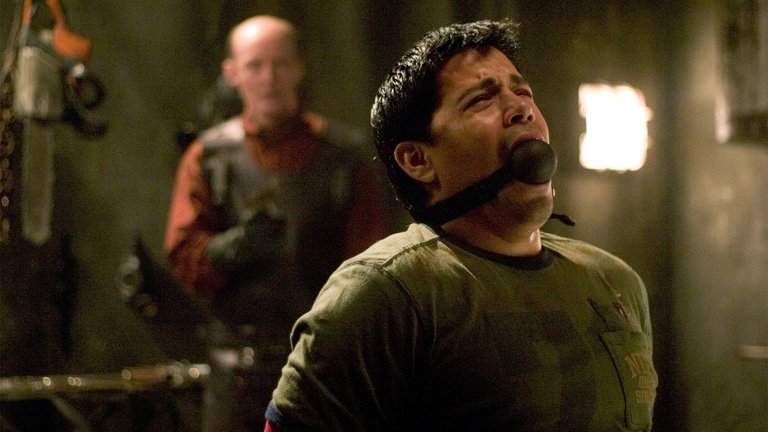Film Review: Hostel (2005)

In the years following the fall of Communism, Slovakia emerged as a popular shooting location for numerous high-budget Hollywood productions. However, films actually set in Slovakia were exceedingly rare. When one such film finally surfaced, it garnered significant attention – but unfortunately, not for the right reasons. The portrayal of Slovakia in this 2005 film, Hostel, directed by Eli Roth and considered one of the most influential works in the horror genre at its time, left Slovakians displeased with their country's representation.
The plot introduces us to Paxton Rodriguez (played byJay Hernandez), a young American tourist, along with his friends Josh Brooks (played by Derek Richardson) and Óli Eriksson (played by Eyþór Guðjónsson). The trio is travelling around Europe, indulging in drugs and sex. In Amsterdam, they discover that their lavish lifestyle might soon deplete their funds, prompting them to consider alternative destinations. A stranger named Alexei (played by Lubomir Bukovy) convinces them to visit Slovakia instead of Barcelona, promising lower prices and more beautiful women. Initially, things seem promising as the friends meet and engage with two local women named Svetlana (played by Barbara Nedeljáková) and Svetlana (played by Jana Kaderabkova). However, Paxton's world takes a dark turn when he discovers that Josh and Óli have vanished. Paxton soon uncovers his friends' gruesome fate after being lured into visiting an old factory that serves as a torture chamber for an international ring of wealthy psychopaths who delight in torturing, mutilating, and killing their victims. To survive this nightmarish scenario, Paxton must rely on all the luck and ingenuity he possesses.
Slovakians had valid reasons to complain about the film's portrayal of their country, as it was depicted as a Third World hellhole with "easy" women, rampant crime, corrupt police, and Romani street children gangs robbing and murdering people. Although the film was actually shot in neighbouring Czechia, this misrepresentation sparked controversy among locals. Critics outside Slovakia, however, were primarily concerned about the high levels of graphic and disturbing violence depicted in Hostel. Many saw Eli Roth's approach as exploitative and gratuitous, pandering to the lowest instincts of his audience in a way that would later be known as "torture porn".
The treatment of women in the film has also been criticized for being misogynistic, with characters portrayed as promiscuous, manipulative, or weaker than men. However, Roth's intentions were not without merit. Inspired by classic 1960s and 1970s grindhouse exploitation cinema and discussions with Quentin Tarantino – who had faced similar criticism over excessive violence in his films – Roth sought to bring back the transgressive quality to the horror genre that was at the time dominated by family-friendly and "safe" PG-13 mainstream Hollywood fare.
Despite its low budget, Hostel showcased great skill from its director. The film's commercial success, along with the success of Saw one year earlier, marked the beginning of a shift towards a slightly more "edgy" form of horror films.
Another factor that contributed to success of Hostel was the change in global sentiments following 9/11 and the War in Iraq, namely the chasm between Americans and the rest of the world, with the former being seen as parochial, arrogant and ignorant. The film played into these newly apparent differences between Americans and the rest of the world by portraying two American characters who display disrespect or ignorance towards foreign culture, which is, together with their naivety and lack of common sense, major catalyst for their later predicament. This is shown at the beginning when the protagonists are lured into Slovakia with the promise of local women “having lost all men in war”, despite that country not being affected by such conflict in near past. The film, as well the villains in the film, played to Americans’ mistaking Slovakia for Slovenia and/or Yugoslavia.
The concept worked well, but was undermined by Roth's inclusion of an Icelander as one of the trio of protagonists. This detail seemed to be introduced out of misplaced notions of "political correctness" rather than any genuine artistic intent.
The success of Hostel led to inevitable sequels, with Hostel: Part II directed by Roth and released in 2007 failing to replicate the impact of its predecessor. The direct-to-video sequel Hostel: Part III followed in 2011.
While some scenes may be disturbing or contain levels of violence that are not suitable for more sensitive audiences, Hostel remains a good piece of cinema that can be recommended to fans of the genre. Its basic premise – an international society of wealthy and powerful perverts using ordinary people as their playthings – now seems less fantastic or far-fetched in light of recent revelations related to Epstein Island.
RATING: 6/10 (++)
Blog in Croatian https://draxblog.com
Blog in English https://draxreview.wordpress.com/
InLeo blog https://inleo.io/@drax.leo
Hiveonboard: https://hiveonboard.com?ref=drax
Rising Star game: https://www.risingstargame.com?referrer=drax
1Inch: https://1inch.exchange/#/r/0x83823d8CCB74F828148258BB4457642124b1328e
BTC donations: 1EWxiMiP6iiG9rger3NuUSd6HByaxQWafG
ETH donations: 0xB305F144323b99e6f8b1d66f5D7DE78B498C32A7
BCH donations: qpvxw0jax79lhmvlgcldkzpqanf03r9cjv8y6gtmk9
Posted Using InLeo Alpha
This movie was quite powerful in terms of violence, I remember my mom got sick, but we still managed to watch it until the end haha
It is ideal for lovers of this kind of movies, but not for sensitive people, like me 😂